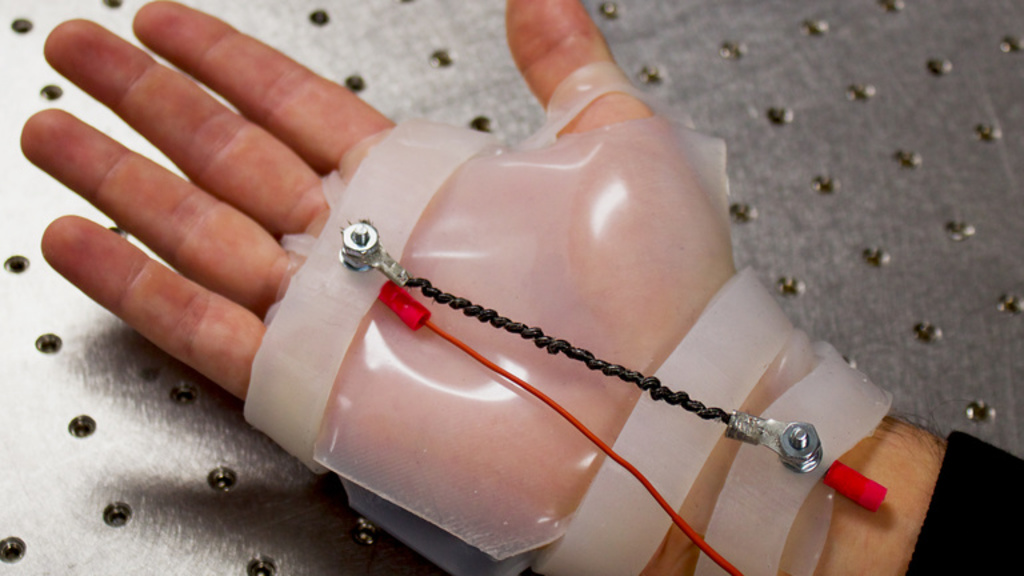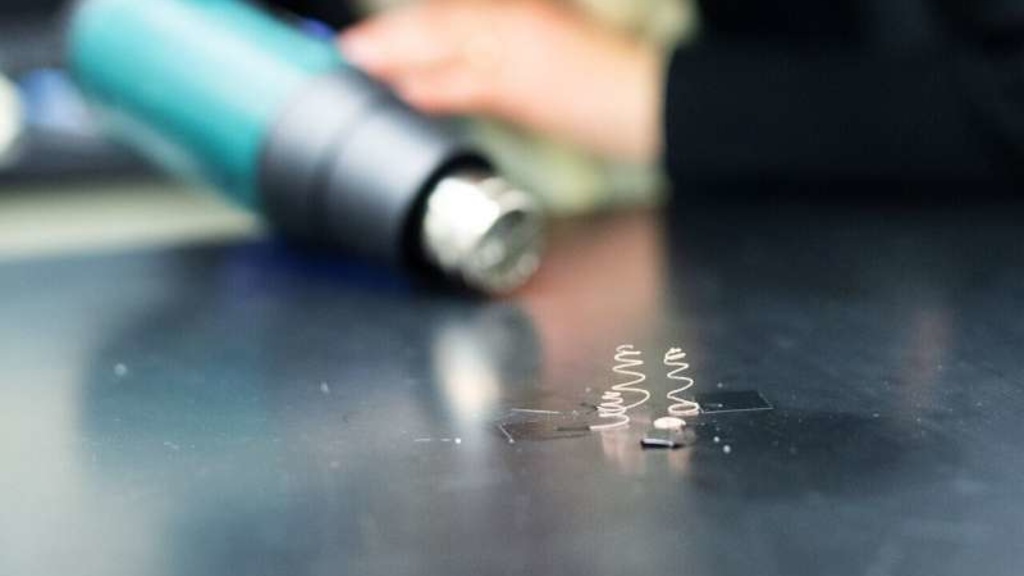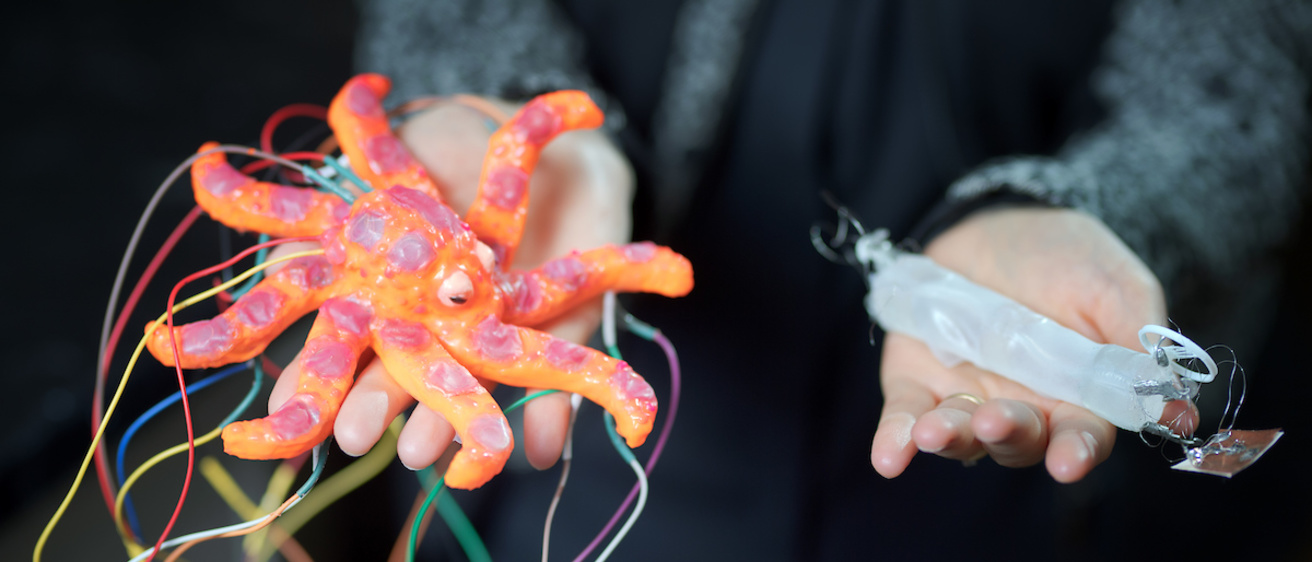
UI mechanical engineering professor receives DARPA Young Investigator Award to develop soft robots inspired by cephalopods’ tentacles
Tuesday, September 14, 2021
Caterina Lamuta was recently awarded a prestigious Young Investigator Award from the Defense Advanced Research Projects Agency (DARPA) to develop new self-morphing, stretchable soft skins (S⁴) for use in underwater vehicles and robots.

Venanzio Cichella e Caterina Lamuta, sono raianesi i due inventori del dispositivo per le disabilità
Tuesday, April 28, 2020
Si chiamano Venanzio Cichella e Caterina Lamuta i due ingegneri raianesi che hanno creato un dispositivo di riabilitazione robotizzato per aiutare le persone con disabilità agli arti fornendo loro una maggiore capacità di movimento.

Researchers at the UI create robotic rehabilitation device to help increase range of motion in the wrist
Sunday, April 26, 2020
Assistant professors in the University of Iowa College of Engineering have developed a robotic device to help people increase their range of motion in the wrist using artificial muscles to increase flexibility.

UI laboratories collaborate on low-cost, lightweight orthotic robotic rehabilitation device
Friday, April 17, 2020
Collaborating at a crossroads of their engineering focuses, the Cooperative Autonomous Systems (CAS) Laboratory and the Smart Multifunctional Material Systems (SMMS) Laboratory at the University of Iowa are working on a new project: the creation of a lightweight, mobile, and low-cost orthotic robotic rehabilitation device.

A smart skin inspired by the cephalopod which can be used in 3D displays and as interfaces for the visually impaired
Wednesday, September 25, 2019
A research team from the University of Iowa and the University of Illinois at Urbana-Champaign is developing a smart skin inspired by the cephalopod that can be used in 3D displays as interfaces for the visually impaired, and to help reduce drag on marine vehicles.
Pagination
More coverage
More coverage
- Eccellenze calabresi. (September 13, 2018). https://www.eccellenzecalabresi.it/muscoli-artificiali-una-ricercatrice-calabrese-oltre-i-limiti-della-scienza/
- Tecnologia de Materiais (Brazil). (May 17, 2018). http://tecnologiademateriais.com.br/portaltm/os-incriveis-musculos-artificiais-de-fibra-de-carbono/
- Wonderful Engineering. (April 2018). https://wonderfulengineering.com/coiled-carbon-fiber-muscle-strongest-yet-can-lift-12000-times-weight/
- Digital Trends. (April 20, 2018). https://www.digitaltrends.com/cool-tech/artificial-muscle-12600x-weight/
- Smart Huanqiu (Chinese). (April 19, 2018). http://smart.huanqiu.com/roll/2018-04/11885709.html
- (April 19, 2018). https://www.yahoo.com/news/artificial-muscle-lift-12-600-161023850.html
- N1plus (Russian). (April 18, 2018). https://nplus1.ru/news/2018/04/18/muscles
- New Atlas. (April 18, 2018). https://newatlas.com/carbon-fiber-artificial-muscle/54256/
- Tech Times. (April 18, 2018). https://www.techtimes.com/articles/225563/20180418/scientists-create-carbon-fiber-artificial-muscles-that-can-lift-12-600-times-their-own-weight.htm
- The Economic Time (Science). (April 18, 2018). https://economictimes.indiatimes.com/news/science/artificial-muscles-that-can-lift-12600-times-their-own-weight/articleshow/63813320.cms
- The Engineer UK. (April 18, 2018). https://www.theengineer.co.uk/carbon-fibre-muscles/
- Verdict, Medical Devices. (April 18, 2018). https://www.medicaldevice-network.com/news/artificial-muscles-can-lift-12600-times-weight/
- Eurekalert! (April 17, 2018). https://www.eurekalert.org/pub_releases/2018-04/uoic-scf041718.php
- (April 16, 2018). https://www.reddit.com/r/science/comments/8d550k/strong_carbon_fiber_artificial_muscles_can_lift/
- You Tube. (April 16, 2018). https://www.youtube.com/watch?v=k7vvBi__LwM
- MechSE UIUC. (April 13, 2018). https://mechanical.illinois.edu/news/strong-carbon-fiber-artificial-muscles-can-lift-12600-times-their-own-weight
- (April 22, 2018). https://www.focus.it/tecnologia/innovazione/i-muscoli-da-hulk-in-fibra-di-carbonio
- Daily Iowan. (September 26, 2019). https://dailyiowan.com/2019/09/26/ui-researchers-develops-smart-skin-for-the-u-s-navy/
- Corriere della Calabria. (September 9, 2018). https://www.corrieredellacalabria.it/regione/cosenza/item/156213-il-muscolo-artificiale-che-parla-calabrese/
- La Repubblica (Italy). (June 15, 2018).
- Il Messaggero. (April 25, 2018). https://www.ilmessaggero.it/tecnologia/hitech/muscoli_artificiali_protesi_umane_robot-3689935.html
- This Artificial Muscle Can Lift 12,600 Times Its Own Weight (April 19, 2018). https://www.newsweek.com/artificial-muscle-can-lift-12600-times-its-own-weight-893237
